|
|
|
Sort Order |
|
|
|
Items / Page
|
|
|
|
|
|
|
| Srl | Item |
| 1 |
ID:
122050
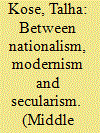

|
|
|
|
|
| Publication |
2013.
|
| Summary/Abstract |
This study discusses the position of Alevi identity and Alevi community with regard to the Turkish national identity-building project. There was a partial compatibility between the Kemalist objective of laicization and nation building and the Alevi practice and understanding of a 'local' version of 'Turkish Islam'. Besides these compatibilities, Alevis faced the challenges of nation-building and homogenization policies, which involved homogenization in ethnic, religious and sectarian domains. Kurmanji- and Zazaki-speaking ethnically Kurdish/Zaza Alevis of Eastern Anatolia had a different experience during the project of centralization and ethnic homogenization, in comparison to Turkish-speaking Turcoman Alevis. This different experience still is a source of division among Alevi communities.
|
|
|
|
|
|
|
|
|
|
|
|
|
|
|
|
| 2 |
ID:
184464
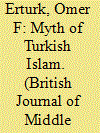

|
|
|
|
|
| Summary/Abstract |
Turkish Islam has been defined as unique and exceptional, and it is suggested that it is an antidote to radical Islamic ideologies due to its adherence to the supposedly moderate and rational Hanafi-Maturidi theology, which is considered to have an inclusive and tolerant Sufi character. Turkish Islam is mostly defined by its Gümüşhanevi lineage, the most successful, though not theologically heterogeneous, of all active Naqshbandi communities in Turkey. Sharing a belief in its non-revolutionary character, some have asserted that it is open to democratic values. This study delves into the concept of ‘Turkish Islam’ in the belief that there is a lack of in-depth textual and methodological analysis to assess these claims. Based on a text-based analysis of primary sources, particularly the works of Ahmed Ziyaeddin Gümüşhanevi and Mehmed Zahid Kotku, two leading masters of the Naqshbandi-Gümüşhanevi discipline, this study uncovers the foundational religious motivation and codes behind Turkish Islam. As a research methodology, content analysis with purposive sampling was conducted, focusing on six of the most defining issues of Islam, al-wala’ wal-bara’, apostasy, jihad, the Islamic state, women, and art and philosophy. The study concludes that Turkish Islam is not unique or even exceptional either at the theological and discursive levels, nor does it necessarily demonstrate a willingness to embrace the values attributed to it.
|
|
|
|
|
|
|
|
|
|
|
|
|
|
|
|
| 3 |
ID:
152450
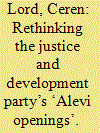

|
|
|
|
|
| Summary/Abstract |
The ‘Alevi openings’ launched in 2007 by the Justice and Development Party have been widely lauded as a historic and unprecedented step in the Turkish Republic. In contrast, this article places the ‘openings’ in a wider historical context, analyzing them in relation to processes of nation-building. Firstly, it is argued that the ‘openings’ marked continuity with previous interventions by state actors, including the military, dating back at least to the 1960s. Secondly, it is contended that these interventions should be regarded as a process of re-framing Alevism within a Turkish–Islamic framework, consigning it to ‘invisibility,’ rather than as democratization.
|
|
|
|
|
|
|
|
|
|
|
|
|
|
|
|
| 4 |
ID:
185550
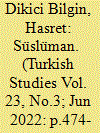

|
|
|
|
|
| Summary/Abstract |
This article argues that class divisions within Islamist community are an emerging aspect of contemporary Turkish politics. Nearly two decades of rule by an Islamist party enabled the Islamic capital to become a distinct capital fraction without improving the living conditions of the devout masses substantially. This fault line appears in the increasingly discernible criticism of the everyday lifestyles of rich Muslim women from within. Controversy over the extravagance of veiled women appears as a proxy class struggle between the new Islamic middle class and the devout poor, as well as the continued polarization between the Islamists and the secularists.
|
|
|
|
|
|
|
|
|
|
|
|
|
|
|
|
| 5 |
ID:
149425
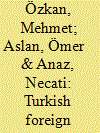

|
|
|
|
|
| Summary/Abstract |
This article is an attempt to answer a number of questions asked in the literature on radicalization and extremism: What motivates foreign terrorist fighters (FTFs) from Turkey to join the Islamic State of Iraq and Syria (ISIS)? In what kind of environment does violent extremism become the choice for Turkish nationals to join ISIS in Syria and Iraq? How can Turkish nationals who join ISIS be profiled in terms of their socio-economic and cultural traits and how do these traits compare people from other nations who join and fight in terrorist organizations? Though their numbers remained minimal compared to the overall population, how can we explain the case of Turkish FTFs, when a peaceful and tolerant ‘Anatolian/Sufi Islam’ has reigned in the country and Muslims are well integrated in the social, economic, and political life of the country under the 13-year long rule of Islamic-oriented Justice and Development Party (AK Party)? What do these answers to these questions mean for Turkish Islam and possible de-radicalization programs? These questions will be addressed by semi-structured interviews conducted both with Turkish FTFs who have joined ISIS and with family members of some of those who have returned from fighting with ISIS.
|
|
|
|
|
|
|
|
|
|
|
|
|
|
|
|
|
|
|
|
|